Daily Archives: November 30, 2019
Rare original ancient Roman silver coin Septimius Severus denarius Elephant
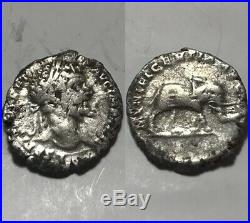
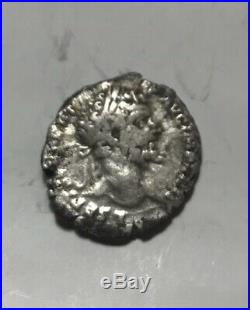
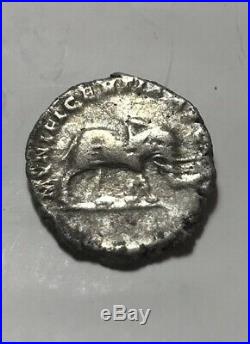
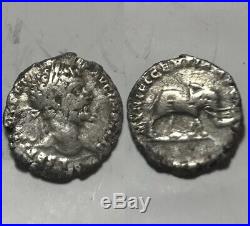
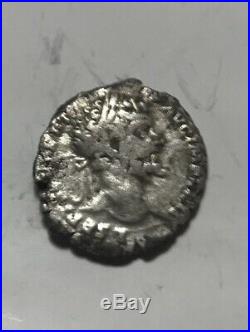
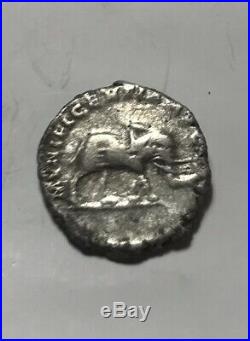
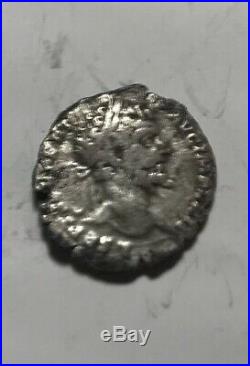
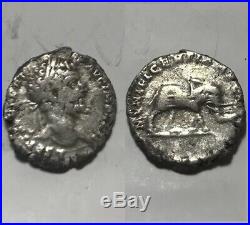
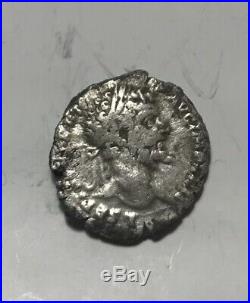

One original ancient Roman silver coin of: Septimius Severus Denarius. Struck – Emesa mint, 196-197 AD. (VF) Well centered nice specimen. / L SEPT SEV PERT AVG IMP VIII, laureate head right /. / MVNIFICENTIA AVG, Elephant wearing cuirass walking right. Commemorates the games, that were also mentioned in the Historia Augusta, which were given by Severus in mid 197 prior to his departure on his second Parthian expedition. The elephant on the coin is neither an Indian nor an African elephant of today, but a now-extinct species which lived in North Africa in Roman times. Sole reign; 195-198 A. Husband of Julia Domna. Lucius Septimius Severus (or rarely Severus I) (April 11, 145/146-February 4, 211) was a Roman general, and Roman Emperor from April 14, 193 to 211. He was born in what is now the Berber part of Rome’s historic Africa Province. Septimius Severus was born and raised at Leptis Magna (modern Berber, southeast of Carthage, modern Tunisia). Severus came from a wealthy, distinguished family of equestrian rank. Severus was of Italian Roman ancestry on his mother’s side and of Punic or Libyan-Punic ancestry on his father’s. Little is known of his father, Publius Septimius Geta, who held no major political status but had two cousins who served as consuls under emperor Antoninus Pius. His mother, Fulvia Pia’s family moved from Italy to North Africa and was of the Fulvius gens, an ancient and politically influential clan, which was originally of plebeian status. His siblings were a younger Publius Septimius Geta and Septimia Octavilla. Severus’s maternal cousin was Praetorian Guard and consul Gaius Fulvius Plautianus. In 172, Severus was made a Senator by the then emperor Marcus Aurelius. In 187 he married secondly Julia Domna. In 190 Severus became consul, and in the following year received from the emperor Commodus (successor to Marcus Aurelius) the command of the legions in Pannonia. On the murder of Pertinax by the troops in 193, they proclaimed Severus Emperor at Carnuntum, whereupon he hurried to Italy. The former emperor, Didius Julianus, was condemned to death by the Senate and killed, and Severus took possession of Rome without opposition. The legions of Syria, however, had proclaimed Pescennius Niger emperor. At the same time, Severus felt it was reasonable to offer Clodius Albinus, the powerful governor of Britannia who had probably supported Didius against him, the rank of Caesar, which implied some claim to succession. With his rearguard safe, he moved to the East and crushed Niger’s forces at the Battle of Issus. The following year was devoted to suppressing Mesopotamia and other Parthian vassals who had backed Niger. When afterwards Severus declared openly his son Caracalla as successor, Albinus was hailed emperor by his troops and moved to Gallia. Severus, after a short stay in Rome, moved northwards to meet him. On February 19, 197, in the Battle of Lugdunum, with an army of 100,000 men, mostly composed of Illyrian, Moesian and Dacian legions, Severus defeated and killed Clodius Albinus, securing his full control over the Empire. Severus was at heart a soldier, and sought glory through military exploits. In 197 he waged a brief and successful war against the Parthian Empire in retaliation for the support given to Pescennius Niger. The Parthian capital Ctesiphon was sacked by the legions, and the northern half of Mesopotamia was restored to Rome. His relations with the Roman Senate were never good. Severus ordered the execution of dozens of Senators on charges of corruption and conspiracy against him, replacing them with his own favorites. He also disbanded the Praetorian Guard and replaced it with one of his own, made up of 50,000 loyal soldiers mainly camped at Albanum, near Rome (also probably to grant the emperor a kind of centralized reserve). During his reign the number of legions was also increased from 25/30 to 33. He also increased the number of auxiliary corps (numerii), many of these troops coming from the Eastern borders. Additionally the annual wage for a soldier was raised from 300 to 500 denarii. Although his actions turned Rome into a military dictatorship, he was popular with the citizens of Rome, having stamped out the rampant corruption of Commodus’s reign. According to Cassius Dio, however, after 197 Severus fell heavily under the influence of his Praetorian Prefect, Gaius Fulvius Plautianus, who came to have almost total control of most branches of the imperial administration. Plautianus’s daughter, Fulvia Plautilla, was married to Severus’s son, Caracalla. Plautianus’s excessive power came to an end in 205, when he was denounced by the Emperor’s dying brother and killed. The two following praefecti , including the jurist Aemilius Papinianus, received however even larger powers. Campaigns in Caledonia (Scotland). Starting from 208 Severus undertook a number of military actions in Roman Britain, reconstructing Hadrian’s Wall and campaigning in Scotland. He reached the area of the Moray Firth in his last campaign in Caledonia, as was called Scotland by the Romans.. In 210 obtained a peace with the Picts that lasted practically until the final withdrawal of the Roman legions from Britain, before falling severely ill in Eboracum (York). He is famously said to have given the advice to his sons: “Be harmonious, enrich the soldiers, and scorn all other men” before he died at Eboracum on February 4, 211. Upon his death in 211, Severus was deified by the Senate and succeeded by his sons, Caracalla and Geta, who were advised by his wife Julia Domna. The stability Severus provided the Empire was soon gone under their reign. Though his military expenditure was costly to the empire, Severus was the strong, able ruler that Rome needed at the time. He began a tradition of effective emperors elevated solely by the military. Severus was also distinguished for his buildings. Apart from the triumphal arch in the Roman Forum carrying his full name, he also built the Septizodium in Rome and enriched greatly his native city of Leptis Magna (including another triumphal arch on the occasion of his visit of 203). Christians were persecuted during the reign of Septimus Severus. Severus allowed the enforcement of policies already long-established, which meant that Roman authorities did not intentionally seek out Christians, but when people were accused of being Christians they could either curse Jesus and make an offering to Roman gods, or be executed. Furthermore, wishing to strengthen the peace by encouraging religious harmony through syncretism, Severus tried to limit the spread of the two quarrelsome groups who refused to yield to syncretism by outlawing conversion to Christianity or Judaism. Individual officials availed themselves of the laws to proceed with rigor against the Christians. Naturally the emperor, with his strict conception of law, did not hinder such partial persecution, which took place in Egypt and the Thebaid, as well as in Africa proconsularis and the East. Christian martyrs were numerous in Alexandria cf. Clement of Alexandria, Stromata , ii. 20; Eusebius, Church History , V. No less severe were the persecutions in Africa, which seem to have begun in 197 or 198 cf. Tertullian’s Ad martyres , and included the Christians known in the Roman martyrology as the martyrs of Madaura. Probably in 202 or 203 Felicitas and Perpetua suffered for their faith. Persecution again raged for a short time under the proconsul Scapula in 211, especially in Numidia and Mauritania. Later accounts of a Gallic persecution, especially at Lyon, are legendary. In general it may thus be said that the position of the Christians under Septimius Severus was the same as under the Antonines; but the law of this Emperor at least shows clearly that the rescript of Trajan had failed to execute its purpose. Original ancient Roman coin as pictured and described above. All items will be sent out in protected envelope and boxed if necessary. Every item offered by cameleoncoins is unconditionally guaranteed to be genuine & authentic. If in the unlikely event that an item is found to be reproduction, full return privileges are within 14 days of receiving the coins. The item “Rare original ancient Roman silver coin Septimius Severus denarius Elephant” is in sale since Tuesday, July 2, 2019. This item is in the category “Coins & Paper Money\Coins\ Ancient\Roman\ Imperial (27 BC-476 AD)”. The seller is “cameleoncoins” and is located in Winnetka, California. This item can be shipped worldwide.
- Date: 196
- Composition: Silver
- Ruler: Septimius Severus
- Denomination: Denarius
- Material: silver

Comments Off
Filed under rare
